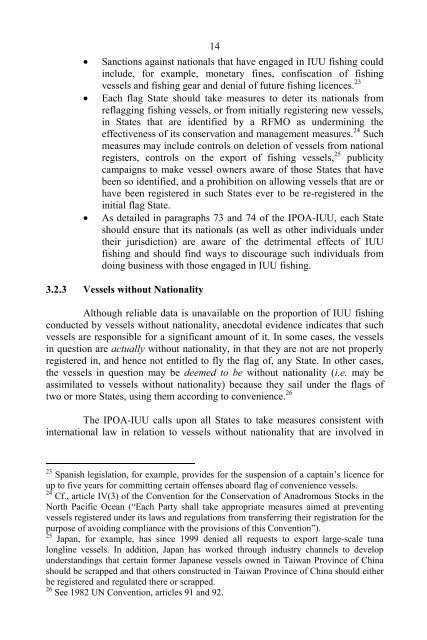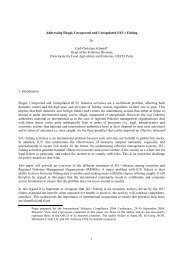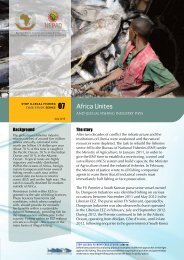13For example, Japan requires its nationals to obtain the permission <strong>of</strong> theJapanese Government before working aboard non-Japanese fishing vesselsoperating in the Atlantic bluefin tuna and southern bluefin tuna fishing areas.The goal <strong>of</strong> this measure is to prevent Japanese nationals from becominginvolved in <strong>IUU</strong> fishing aboard foreign vessels. Japan also intends to denypermission to any Japanese national to work aboard a foreign fishing vessel inany other fishery, if the vessel’s flag State is not a member <strong>of</strong> the RFMOregulating that fishery. 20 New Zealand and Australia have also enactedlegislation restricting the activities <strong>of</strong> their respective nationals aboard foreignvessels registered in States meeting certain criteria.In the United States <strong>of</strong> America, the Lacey Act makes it unlawful forany person subject to U.S. jurisdiction to “import, export, transport, sell, receive,acquire, possess or purchase any fish ... taken, possessed or sold in violation <strong>of</strong>any ... foreign ... law, treaty or regulation.” Hence, a U.S. national may beprosecuted for engaging in certain forms <strong>of</strong> <strong>IUU</strong> fishing aboard foreign vessels. 21To fulfil the commitments contained in the <strong>IPOA</strong>-<strong>IUU</strong> relating tocontrol <strong>of</strong> nationals, all States should consider adopting measures along theselines and should consider taking the following steps as well:Each State should make it a violation <strong>of</strong> its law for its nationals toengage in fishing activities that violate the fishery conservation andmanagement laws <strong>of</strong> any other State or that undermine theeffectiveness <strong>of</strong> conservation and management measures adoptedby a RFMO. 2220 See “The Importance <strong>of</strong> Taking Cooperative Action Against Specific Fishing Vesselsthat are Diminishing Effectiveness <strong>of</strong> Tuna Conservation and Management Measures,” byMasayuki Komatsu.21 See United States Code, Title 16, Chapter 53. For further discussion <strong>of</strong> how the LaceyAct might be adapted for other situations involving <strong>IUU</strong> fishing, see “National LegislativeOptions to Combat <strong>IUU</strong> Fishing,” by Blaise Kuemlangan.22 Such a law could be drafted as follows:A person subject to the jurisdiction <strong>of</strong> [State] who –(a) on his or her own account, or as partner, agent or employee <strong>of</strong> another person,lands, imports, exports, transports, sells, receives, acquires or purchases; or(b) causes or permits a person acting on his behalf, or uses a fishing vessel, to land,import, export, transport, sell, receive, acquire or purchase,any fish taken, possessed, transported or sold contrary to the law <strong>of</strong> another State or in amanner that undermines the effectiveness <strong>of</strong> conservation and management measuresadopted by a Regional Fisheries Management Organization shall be guilty <strong>of</strong> an <strong>of</strong>fenceand shall be liable to pay a fine not exceeding (insert monetary value).
14Sanctions against nationals that have engaged in <strong>IUU</strong> fishing couldinclude, for example, monetary fines, confiscation <strong>of</strong> fishingvessels and fishing gear and denial <strong>of</strong> future fishing licences. 23Each flag State should take measures to deter its nationals fromreflagging fishing vessels, or from initially registering new vessels,in States that are identified by a RFMO as undermining theeffectiveness <strong>of</strong> its conservation and management measures. 24 Suchmeasures may include controls on deletion <strong>of</strong> vessels from nationalregisters, controls on the export <strong>of</strong> fishing vessels, 25 publicitycampaigns to make vessel owners aware <strong>of</strong> those States that havebeen so identified, and a prohibition on allowing vessels that are orhave been registered in such States ever to be re-registered in theinitial flag State.As detailed in paragraphs 73 and 74 <strong>of</strong> the <strong>IPOA</strong>-<strong>IUU</strong>, each Stateshould ensure that its nationals (as well as other individuals undertheir jurisdiction) are aware <strong>of</strong> the detrimental effects <strong>of</strong> <strong>IUU</strong>fishing and should find ways to discourage such individuals fromdoing business with those engaged in <strong>IUU</strong> fishing.3.2.3 Vessels without NationalityAlthough reliable data is unavailable on the proportion <strong>of</strong> <strong>IUU</strong> fishingconducted by vessels without nationality, anecdotal evidence indicates that suchvessels are responsible for a significant amount <strong>of</strong> it. In some cases, the vesselsin question are actually without nationality, in that they are not are not properlyregistered in, and hence not entitled to fly the flag <strong>of</strong>, any State. In other cases,the vessels in question may be deemed to be without nationality (i.e. may beassimilated to vessels without nationality) because they sail under the flags <strong>of</strong>two or more States, using them according to convenience. 26The <strong>IPOA</strong>-<strong>IUU</strong> calls upon all States to take measures consistent withinternational law in relation to vessels without nationality that are involved in23 Spanish legislation, for example, provides for the suspension <strong>of</strong> a captain’s licence forup to five years for committing certain <strong>of</strong>fenses aboard flag <strong>of</strong> convenience vessels.24 Cf., article IV(3) <strong>of</strong> the Convention for the Conservation <strong>of</strong> Anadromous Stocks in theNorth Pacific Ocean (“Each Party shall take appropriate measures aimed at preventingvessels registered under its laws and regulations from transferring their registration for thepurpose <strong>of</strong> avoiding compliance with the provisions <strong>of</strong> this Convention”).25 Japan, for example, has since 1999 denied all requests to export large-scale tunalongline vessels. In addition, Japan has worked through industry channels to developunderstandings that certain former Japanese vessels owned in Taiwan Province <strong>of</strong> Chinashould be scrapped and that others constructed in Taiwan Province <strong>of</strong> China should eitherbe registered and regulated there or scrapped.26 See 1982 UN Convention, articles 91 and 92.
- Page 4 and 5: iiiPREPARATION OF THIS DOCUMENTThe
- Page 6 and 7: vThe IPOA-IUU is voluntary. However
- Page 8 and 9: viii6.2 Examples of some port State
- Page 10 and 11: xiBACKGROUND1. From ancient times,
- Page 12 and 13: xiii11. The Code is voluntary. Howe
- Page 14 and 15: 1. INTERNATIONAL PLAN OF ACTION - I
- Page 16 and 17: 3Since the late 1990s, a number of
- Page 18 and 19: 5(1) conducted by national or forei
- Page 20 and 21: 7flag States, coastal States and Po
- Page 22 and 23: 9In light of this, the very first
- Page 24 and 25: 11the vessels rarely if ever visit
- Page 28 and 29: 15IUU fishing on the high seas. 27
- Page 30 and 31: 17end all forms of government econo
- Page 32 and 33: 19developing States, 36 have introd
- Page 34 and 35: 21If the vessel is fishing on the h
- Page 36 and 37: 23registering a vessel that has a h
- Page 38 and 39: 25RFMOs have a role to play in ensu
- Page 40 and 41: 27FAO, in turn, will make available
- Page 42 and 43: 29species can be caught, what gear
- Page 44 and 45: 31Flag States are also encouraged t
- Page 46 and 47: 33cases, fishing vessels registered
- Page 48: 35light of this, paragraph 51 of th
- Page 51 and 52: 38transshipment at sea is prohibite
- Page 53 and 54: 40supported IUU fishing. For exampl
- Page 55 and 56: 42Japan prohibits port calls by tun
- Page 57 and 58: 44of a NAFO member, it must be insp
- Page 59 and 60: 46discussed in Section 7 of these g
- Page 61 and 62: 48products harvested through IUU fi
- Page 63 and 64: 50products. On the basis of that da
- Page 65 and 66: 52question, while the latter only c
- Page 67 and 68: 54States can also combat IUU fishin
- Page 69 and 70: 56RFMOs engage in IUU fishing. No s
- Page 71 and 72: 588.3 Possibilities for Further Act
- Page 73 and 74: 60resolutions calling on those memb
- Page 75 and 76: 62landings, port control, and inspe
- Page 77 and 78:
648.3.8 Actions in Response to Rema
- Page 79 and 80:
66As a result, IUU fishers often co
- Page 81 and 82:
68A number of other developed State
- Page 83 and 84:
702.4 Measures to control transport
- Page 85 and 86:
10.3 Suggested Format for Reports t
- Page 87 and 88:
74Flag States should closely contro
- Page 89 and 90:
76A coastal State should consider r
- Page 91 and 92:
78To assist States in implementing
- Page 93 and 94:
12. LITERATURE CITED80Agnew, D.J. 2
- Page 95 and 96:
82Greenpeace. 2001. Pirate Fishing:
- Page 97 and 98:
84II. NATURE AND SCOPE OF IUU FISHI
- Page 99 and 100:
86to the Conservation and Managemen
- Page 101 and 102:
National Legislation88Legislation16
- Page 103 and 104:
90National Plans of Action25. State
- Page 105 and 106:
9236.2 having taken into account al
- Page 107 and 108:
9446.3 the species, fishing gear au
- Page 109 and 110:
9651.2 cooperation and exchange of
- Page 111 and 112:
98general operating guidelines for
- Page 113 and 114:
100and should consider measures to
- Page 115 and 116:
10280.9 development of observer pro
- Page 117 and 118:
10486.3 the strengthening of region
- Page 119 and 120:
106Articles V, VI, and VII of the A
- Page 121 and 122:
1084.2 To the greatest extent pract
- Page 123 and 124:
110• Compliance with other aspect
- Page 125 and 126:
1126. Information regarding such si
- Page 127 and 128:
114Annex ACommon English Name Scien
- Page 129 and 130:
1164. Parties shall consider and ac
- Page 131 and 132:
118Committed to take steps, consist
- Page 133 and 134:
1209. An export-validated Dissostic
- Page 135:
122APPENDIX VIWEBSITES OF SELECTED
















